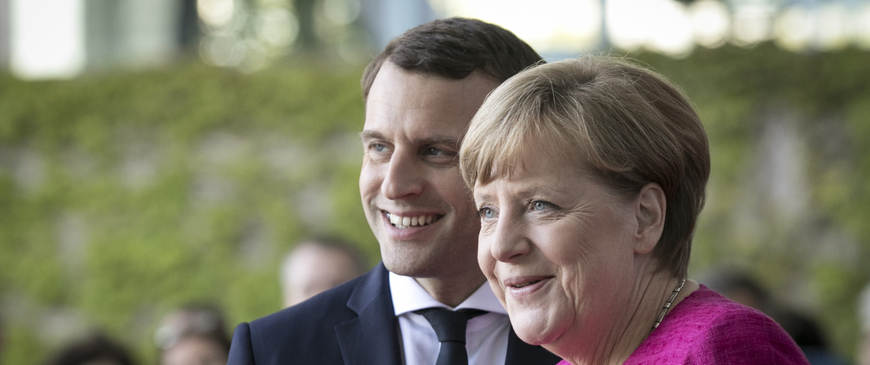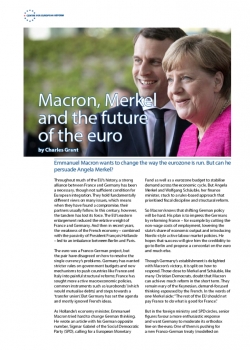
Macron, Merkel and the future of the euro
Emmanuel Macron wants to change the way the eurozone is run. But can he persuade Angela Merkel?
Throughout much of the EU’s history, a strong alliance between France and Germany has been a necessary, though not sufficient condition for European integration. They hold fundamentally different views on many issues, which means when they have found a compromise, their partners usually follow. In this century, however, the tandem has lost its force. The EU’s eastern enlargement reduced the relative weight of France and Germany. And then in recent years, the weakness of the French economy – combined with the passivity of President François Hollande – led to an imbalance between Berlin and Paris.
The euro was a Franco-German project, but the pair have disagreed on how to resolve the single currency’s problems. Germany has wanted stricter rules on government budgets and new mechanisms to push countries like France and Italy into painful structural reforms; France has sought more active macroeconomic policies, common instruments such as ‘eurobonds’ (which would mutualise debts) and steps towards a ‘transfer union’. But Germany has set the agenda and mostly ignored French ideas.
#Macron wants to change the way the eurozone is run. But can he persuade #Merkel?
As Hollande’s economy minister, Emmanuel Macron tried hard to change German thinking. He wrote an article with his German opposite number, Sigmar Gabriel of the Social Democratic Party (SPD), calling for a European Monetary Fund as well as a eurozone budget to stabilise demand across the economic cycle. But Angela Merkel and Wolfgang Schäuble, her finance minister, stuck to a rules-based approach that prioritised fiscal discipline and structural reform.
So Macron knows that shifting German policy will be hard. His plan is to impress the Germans by reforming France – for example by cutting the non-wage costs of employment, lowering the state’s share of economic output and introducing Nordic-style active labour market policies. He hopes that success will give him the credibility to go to Berlin and propose a concordat on the euro and much else.
Though Germany’s establishment is delighted with Macron’s victory, it is split on how to respond. Those close to Merkel and Schäuble, like many Christian Democrats, doubt that Macron can achieve much reform in the short term. They remain wary of the Keynesian, demand-focused thinking espoused by the French. In the words of one Merkel aide: "The rest of the EU should not pay France to do what is good for France."
But in the foreign ministry and SPD circles, senior figures favour a more enthusiastic response and want Germany to moderate its orthodox line on the euro. One of them is pushing for a new Franco-German treaty (modelled on the Elysée treaty of 1963) and joint bonds as a stepping stone to eurobonds. He says that in any new coalition agreement with the Christian Democrats, the SPD would insist on ceding to some French requests.
Yet the conservatism of Germany’s voters and politicians makes it unlikely that Macron will get very far in redesigning eurozone governance, at least in the short term. The Frankfurter Allgemeine Zeitung recently called Macron a ‘cher ami’, in the sense of both dear and expensive. Der Spiegel quipped that "Macron will save Europe and Germany will pay".
When Macron met Merkel in Berlin on May 15th, Le Monde noted that she was "less lyrical" than he was; over a dozen years she has grown used to meeting new French presidents who promise to reform France and revive the EU. Macron did his best to reassure, saying that he did not want eurobonds to cover past debts. But he said he favoured mutual instruments to cover future investments.
Indeed, one of Macron’s priorities seems to be to persuade Germany to boost investment, both at home and in the EU, to stimulate demand. When they were ministers, he and Gabriel commissioned two eminent economists – Jean Pisani-Ferry, now a Macron adviser, and Henrik Enderlein, director of the Jacques Delors Institute Berlin – to write a paper on economic reform in France and Germany. They proposed that EU money should go into new collective instruments to support private and public investment in the eurozone.
The big changes to the eurozone that Macron wants would require treaty change. But both Merkel and Hollande – and virtually every other EU leader – have opposed this, because of the near-impossibility of getting every member-state to ratify the revision. Yet in Berlin, Macron said treaty change was no longer taboo. Merkel responded politely that "if we can say why, what for, what the point is, then we will be ready". But in fact the chances of a new EU treaty in the foreseeable future remain remote. Merkel’s own advisers dislike the idea and believe that the current treaties can accommodate considerable reform. What is perhaps conceivable, especially if some countries seek to block radical change, is a non-EU treaty among eurozone countries, like the ‘fiscal compact’ of 2012.
During Germany’s election campaign, the Christian Democrats will attack the SPD line on the euro as profligate. Merkel looks likely to win in September, and even if the SPD ends up in a stronger position in a new grand coalition, Merkel’s cautious approach to the euro is likely to predominate.
But once the election is out of the way, Merkel will probably want to give Macron a little of what he wants, especially if he achieves reform in France – not because the German financial establishment recognises that its euro policies have been intellectually flawed, but because of the EU’s power politics. The UK’s departure means that Germany needs France more than ever, as a partner in helping it to run the EU. There are no other suitable partners. Merkel knows that if she spurns Macron, eurosceptics in France will profit.
#Merkel knows that if she spurns #Macron, eurosceptics in France will profit
Indeed, some of the German politicians most committed to close ties with Paris reckon that the broader the bargaining between the two countries, the better the chances of Germany modifying its stance on the euro. They say that if France made a stronger commitment to German and European security – could it even extend its nuclear umbrella eastward? – Merkel could hardly resist making concessions to Macron. Macron is an enthusiast for European defence co-operation and wants as broad a relationship with Berlin as possible.
A stronger Franco-German tandem would be good for the EU. For example, a Macron-influenced reform of eurozone governance could ease tensions between north and south, by encouraging growth in Italy (which many French and German policy-makers consider the weakest link in the currency union). But there is another fault-line, between east and west, which a Franco-German compact could worsen, unless Merkel and Macron are very careful.
Poland and Hungary in particular, and the eastern countries in general, have fallen out with Brussels and Berlin over refugee quotas, which the easterners reject. They also worry that in the more ‘flexible’ Europe that France and Germany seem to favour – and which may involve deeper eurozone integration – they will be left behind as ‘second class’ member-states. In addition, Poland and Hungary are in trouble over the rule of law; many member-states accuse them of eroding press freedom and judicial independence.
Although Warsaw and Budapest are undoubtedly responsible for some of their current difficulties, Macron and Merkel will have to work hard to prevent this fault-line worsening. They should try and revive the dormant ‘Weimar Triangle’ that brings Poland, France and Germany together. They should make every effort to consult eastern countries on the future of the EU, and ask them for ideas. A more united Europe cannot exclude the east.
Charles Grant is director of the Centre for European Reform.

